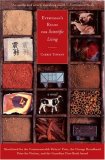Summary | Excerpt | Reviews | Beyond the Book | Readalikes | Genres & Themes | Author Bio

A Novel
by Carrie Tiffany
The sitting car rumbles again with discussion. Mary has joined the dairy
demonstrators who are talking about mastitis. Mary and I have talked about
mastitis late at night in our bunks -- Mary hanging above me like the dairy
angel, her voice muffled in the small space of our sleeping compartment.
"Dad can tell just by their faces. They'll be walking into the shed of a
morning and he'll say, Mary, take this one out, she's got sore..."
"Sore what? Come on, what did he say?"
Mary whispers, "Titties. I get a basin of warm water and Dettol and
sit and massage her udder. Sometimes it's burning, so hot and swollen. I have to
be very gentle, kneading like dough. I can tell if I am doing it the right way
because she gives this special sort of grunt. Sometimes the kneading frees
things up and a big spurt of first milk comes out, all over me."
When Mary talks mastitis my chest buzzes. It is a surging feeling around my
nipples. To quiet it I must lay my hands upon my breasts and think cool
thoughts.
I notice, whilst Mary talks mastitis with the men in the sitting car, her own
hand is flat upon her bodice, not cupping a breast but skirting her throat and
down a little where the flesh softens and parts into two.
Mary says I will find love in the sitting car but I am not looking for it. I
sit and sew while Mary and the men talk and Sister Crock calculates her
statistics. Sewing looks industrious and involving but I can drill stitches
while barely looking at my fingers. I sit and sew and listen. I am listening for
something important, some piece of knowledge that will take hold of me, that
will give me the same certainty of purpose as the men I sit amongst.
I know I won't find knowledge in the women's car. I'm not fooled by Sister
Crock's methods -- we are merely playing at science, using its language to dress
up the drudgery of women's lives. There was no certainty in the lives of the
women who gathered in my aunt's front room for fittings and alterations and tea
and endless stories of shameful births, wayward children, and disappointment.
Women's talk.
Progress is the word that dips and slides through the men's discussions in
the sitting car. Men bring progress. They are so sure of progress they measure
it constantly -- number of acres cleared in a day, bushels of hay cut, pints of
milk produced, acres of seed sown, tons of firewood cut. Men measure the
activity of progress "per man, per day." Four acres of Mallee scrub can be
cleared per man, per day. Although this seems to deny something that even I can
see -- that all men are different, that some light the way with their ideas and
others are merely followers.
Take Mr. Baker, sitting next to me on the banquette, with his thick orange
whiskers sprouting at unruly angles. Mr. Baker wants to speak only of pigs. He
has on board some prime specimens, which he reminds us of often. His three
breeds of pigs, pure Berkshire, middle Yorkshire, and large Yorkshire, are the
"triumvirate of future quality." He likes to muse on the numerous crossings and
uncrossings that can be achieved among the three breeds and predict what might
be produced.
Mr. Talbot, on my other side, talks sheep diseases. He is a little shy. Mary
says this is not unusual for a sheep man. Mr. Talbot has a long, thin face and
soulful eyes. Sometimes I help him color in his slides of the tissue diseases of
sheep. He has a child's pencil case with a beautiful set of colored pencils. I
am to use natural colors, he says, lots of reds and pinks. Then I label the
drawings in black ink and draw arrows to features of interest. I have colored
tuberculosis, actinomycosis, contagious pleuropneumonia, liver fluke, and
hydatids.
Then there's the superintendent, sitting stiffly at his desk drafting
telegrams to the agriculture minister describing our progress. Sometimes he will
give us all an "impromptu lecturette" on our roles as propagandists and the
importance of agricultural education in the development of a truly modern
society. Most of us have been on the train for several tours -- a year or more
-- but we still listen politely.
Copyright © 2005 by Carrie Tiffany
Your guide toexceptional books
BookBrowse seeks out and recommends the best in contemporary fiction and nonfiction—books that not only engage and entertain but also deepen our understanding of ourselves and the world around us.